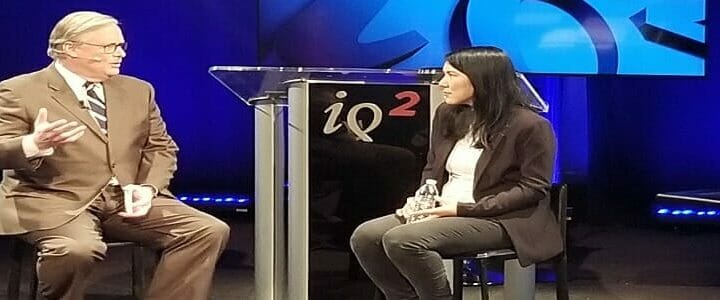With yesterday’s release of three American prisoners from North Korea, optimism for talks on June 12 between Kim Jong-un and President Trump continues to grow. This is an unbelievably positive turn for the regime who last June returned detainee Otto Warmbier to the U.S. in a coma, only to die six days later. Warmbier was a college student accused of espionage after he tried to take a propaganda poster.
Do North Korea’s recent attempts to soften its image mean anything? Or is this just another act from a regime who has been brainwashing its people for years?
A recent debate hosted by Intelligence²—an organization that fosters public discourse—diplomats and intelligence professionals debated this point: Can negotiations denuclearize North Korea? Event attendees overwhelmingly voted “no.” But perhaps the most interesting part of the debate was the discussion beforehand with Korean-American journalist Suki Kim. Like two of the detainees released yesterday, she taught at North Korea’s only private university, Pyongyang University of Science and Technology (PUST). But unlike the detainees, she did actually commit espionage—and somehow escaped to tell the tale.
What Is It Like to Visit North Korea?
“It’s like going to Disney World and you’re on tour with Cinderella.” That’s how journalist Suki Kim describes her brief visit to North Korea in 2008 to cover the New York Philharmonic Orchestra’s historic performance in Pyongyang. On such a short trip, it was impossible to see anything besides the regime’s carefully-crafted propaganda.
This was not Kim’s first nor her last visit to the hermit kingdom. She visited in 2002 to cover the celebration of then Great Leader Kim Jong-il’s 60th birthday—another brief trip orchestrated by the DPRK public relations machine. However, her visit in 2011 was quite different. In order to conduct her book research, she needed a way to stay in the country longer.
One of Kim’s many attempts to gain entry was through an evangelical Christian organization that ran North Korea’s only private university: Pyongyang University of Science and Technology (PUST). It’s at this same university that two of the just-released detainees were teachers—Kim Hak-song and Tony Kim.
Though she was not religious, it did not matter; the school is not allowed in any way to proselytize to students. After three years of courting the organization, she was able to gain a job teaching English for 6 months. To review: Suki Kim was an undercover journalist pretending to be an English teacher and missionary (who, in order to comply with the regime, had to pretend to not be a missionary—did you catch all that?).
How to Document a Dictatorship (and Not Get Caught)
As you can imagine, Kim had to put on many acts simultaneously—and all under constant surveillance. The school was on a military compound that was under constant guard. Minders lived beneath her room and watched her 24/7. Her room was bugged and she was required to eat three meals a day with her students. In her words, being there was “unbearable” because of the exhaustion of being constantly watched.
Since she was a teacher, Kim was allowed to have a laptop. This was how she was able to write notes for what would become her 2014 book, “Without You, There Is No Us.” However, the laptop could be seized or searched at any time. Writing early in the mornings and late at night, Kim had to hide her notes within her lesson plans, then delete any trace after writing them.
She was able to preserve her notes by putting them on a small USB drive that she wore around her neck at all times—like a necklace. Losing the thumb drive would have meant not only losing her research, but almost assured accusations of espionage and imprisonment.
Citizens Are Prisoners, Too
Though Kim’s situation was uniquely stressful and scary, citizens are hardly more free. Not only can they not travel outside their country, they cannot even travel within their country. There is only one official television channel, which only broadcasts programs about the Great Leader, Kim Jong-un. Genuine knowledge of the outside world is almost nonexistent.
Kim pointed out several times that her 20 year-old male students seemed much younger because of the abuse they endured. Their intensely controlled lives never allowed them develop critical thinking or decision making skills. As a result, these 20 year-old young men often seemed more like 8 year-old boys.
She also told the story of her grandparents whose son was taken in the days after the Korean War. He was taken across to the North ,which walled itself off after the conflict. Her mother never moved, hoping and waiting someday that her son would return to their home. But instead, he just disappeared, never to be heard from again. Kim noted that her story is not rare. A whole generation of Koreans died never knowing what happened to their loved ones, separated with no closure. As Kim said, “It was really irrevocable, the damage that’s been done to them psychologically.”
The safe return of Kim Dong-chul, Kim Hak-song, and Tony Kim are absolutely reasons to celebrate—whatever comes of talks between Trump and Kim Jong-un. The experience of Otto Warmbier and the somewhat miraculous survival of Suki Kim are frightening reminders of what their fate could have been.



